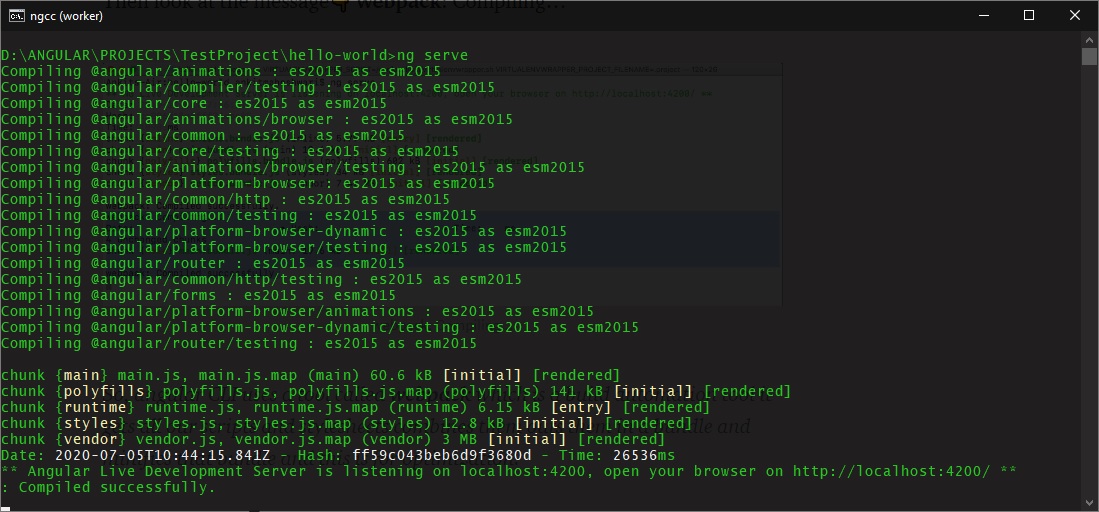Webpack: The Architect Behind Angular’s Startup
Imagine waking up in the morning, turning on your coffee machine, and watching it go through its startup routine—grinding beans, heating water, and finally pouring a perfectly brewed cup. Just like that morning ritual, an Angular application has its own startup process, an orchestration of steps happening behind the scenes before users can interact with it. And at the heart of this workflow? Webpack, the unsung hero ensuring everything comes together seamlessly.
The Role of Webpack in an Angular Application
Think of Webpack as the conductor of an orchestra—organizing, bundling, and optimizing every single JavaScript, CSS, and HTML file before delivering the final masterpiece: a functional Angular application.
Angular is built using modular JavaScript, meaning the codebase consists of numerous files—components, services, directives, and dependencies—scattered across the project. The browser, however, doesn’t naturally understand this modular structure. This is where Webpack steps in.
Module Bundling
Webpack gathers all those scattered pieces—Angular modules, third-party libraries, and assets—then bundles them into a few optimized files. Instead of loading hundreds of individual JavaScript files, the browser gets a few neatly packed bundles, speeding up performance.
Dependency Resolution
Webpack intelligently analyzes dependencies, ensuring each module has access to what it needs. Imagine assembling a puzzle—you need all the correct pieces in the right places before the final picture emerges.
Code Optimization
Nobody wants bloated files slowing things down. Webpack automatically minimizes and optimizes assets, removing unnecessary code (tree-shaking) and compressing everything to reduce load time.
Hot Module Replacement (HMR)
Think of making edits to a painting. You don’t restart from scratch—you tweak colors, adjust shadows, and refine details. Hot Module Replacement (HMR) works the same way. Instead of refreshing the browser every time you modify Angular code, HMR swaps the updated modules in real time, preserving the application state.
To enable HMR in Angular:
- Open
angular.json - Add the following under
serveoptions:
"hmr": true
ng serve --hmr
Now, every code change seamlessly updates without losing your session state.
Loaders: The Workshop Assistants
Before Webpack bundles files, it needs to prepare them—just like an artist priming a canvas before painting. Loaders act as these preparatory assistants. They transform files into formats that Webpack can understand. For example:
- TypeScript Loader (
ts-loader) converts TypeScript into JavaScript before bundling. - SASS Loader (
sass-loader) processes SCSS stylesheets, converting them into standard CSS. - Image Loaders (
file-loader,url-loader) optimize images before they become part of the bundle. Each loader performs a specialized task, ensuring that source files are properly prepared before bundling.
Plugins: The Master Craftsmen
While loaders handle file transformations, plugins extend Webpack’s core abilities—like skilled craftsmen adding final details to a grand design.
Some essential Webpack plugins include:
HtmlWebpackPlugin– Automatically generates an HTML file and injects bundled scripts.MiniCssExtractPlugin– Extracts CSS files, improving performance.CommonsChunkPlugin– Splits code into smaller bundles, optimizing loading speed. Plugins offer powerful enhancements, making Webpack even more efficient
Configuration: The Blueprint
Just as an architect needs blueprints, Webpack relies on a configuration file: webpack.config.js. This file defines key elements such as:
- Entry points – Where Webpack begins processing (
main.tsin Angular). - Output paths – Where the final bundled files are stored.
- Loaders – Which transformations should be applied.
- Plugins – Enhancements for optimizing performance. A typical configuration might look like this
1
2
3
4
5
6
7
8
9
10
11
12
13
14
15
16
module.exports = {
entry: './src/main.ts',
output: {
filename: 'bundle.js',
path: __dirname + '/dist',
},
module: {
rules: [
{ test: /\.ts$/, use: 'ts-loader' },
{ test: /\.scss$/, use: ['style-loader', 'css-loader', 'sass-loader'] }
]
},
plugins: [
new HtmlWebpackPlugin({ template: './src/index.html' })
]
};
This setup ensures Webpack efficiently processes and bundles the Angular application.
How an Angular Application Starts Up
Let’s picture an audience settling into a theater. The curtain rises, lights dim, and the show begins—this is exactly what happens when an Angular application launches.
The Entry Point: main.ts
Like pressing the power button on a computer, main.ts initializes the application. It bootstraps the root module, typically AppModule, calling:
platformBrowserDynamic().bootstrapModule(AppModule);
This kicks off the startup sequence
The AppModule Awakens
Inside AppModule, Angular identifies all the building blocks—components, services, and dependencies—needed to run the application.
Component Rendering
The root component, usually AppComponent, takes center stage. Angular scans the HTML template, applying bindings, processing directives, and constructing the DOM.
Dependency Injection
If the application relies on external services (e.g., fetching data from an API), Angular injects them using its dependency injection system, ensuring smooth functionality.
Event Loop & Change Detection
Once loaded, Angular monitors user interactions through its event loop and change detection mechanism, continuously updating the UI.
The Bigger Picture
Webpack is more than just a bundler—it’s a master orchestrator, preparing, optimizing, and structuring an Angular application before it reaches the user’s browser. With loaders transforming files, plugins enhancing functionality, and Hot Module Replacement making development smoother, Webpack ensures Angular remains fast, efficient, and developer-friendly.
Every time someone launches an Angular project, it’s like the opening scene of a play—a well-orchestrated combination of preparation, execution, and performance. Happy coding!

